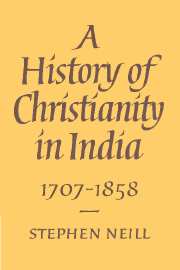Book contents
- Frontmatter
- Contents
- Preface
- Editorial Note
- Abbreviations
- 1 India and Political Change, 1706–86
- 2 The Tranquebar Mission
- 3 The Thomas Christians in Decline and Recovery
- 4 Roman Catholic Missions
- 5 Anglicans and Others
- 6 The Suppression of the Jesuits
- 7 The New Rulers and the Indian Peoples
- 8 Government, Indians and Missions
- 9 Bengal, 1794–1833
- 10 New Beginnings in the South
- 11 The Thomas Christians in Light and Shade
- 12 Anglican Development
- 13 The Recovery of the Roman Catholic Missions
- 14 Education and the Christian Mission
- 15 Protestant Expansion in India
- 16 Indian Society and the Christian Message
- 17 Towards an Indian Church
- 18 The Great Uprising
- APPENDICES
- Notes
- Select Bibliographies
- Index
2 - The Tranquebar Mission
Published online by Cambridge University Press: 07 September 2009
- Frontmatter
- Contents
- Preface
- Editorial Note
- Abbreviations
- 1 India and Political Change, 1706–86
- 2 The Tranquebar Mission
- 3 The Thomas Christians in Decline and Recovery
- 4 Roman Catholic Missions
- 5 Anglicans and Others
- 6 The Suppression of the Jesuits
- 7 The New Rulers and the Indian Peoples
- 8 Government, Indians and Missions
- 9 Bengal, 1794–1833
- 10 New Beginnings in the South
- 11 The Thomas Christians in Light and Shade
- 12 Anglican Development
- 13 The Recovery of the Roman Catholic Missions
- 14 Education and the Christian Mission
- 15 Protestant Expansion in India
- 16 Indian Society and the Christian Message
- 17 Towards an Indian Church
- 18 The Great Uprising
- APPENDICES
- Notes
- Select Bibliographies
- Index
Summary
THE PERIOD OF ZIEGENBALG 1706–19
On 9 July 1706 the first Protestant missionaries to India, Bartholomew Ziegenbalg and Henry Plütschau, arrived at Tranquebar on the Coromandel Coast about 150 miles south of Madras. A new epoch in the history of the Christian mission had begun.
The Danes had been in Tranquebar (Tarangambādi, ‘the dashing of the ocean waves on the shore’) since 1620. The area which they rented from the king of Thañjāvur (Tanjore) was no more than five miles by three in extent. Then as now Tranquebar was a small, agreeable port-town, with no good harbour, and a population which was reckoned at 15,000. There was one other village, almost large enough to be called a town, Poreiyār, and fifteen smaller villages. The Danes were more careful than some other powers of the spiritual welfare of their subjects. The establishment in their Indian outpost included two resident chaplains; these held no permanent appointment, and, when one of them was due to return to Denmark, his place was usually taken by the chaplain of one of the ships which periodically arrived from Europe. There are occasional references in official documents to the duty of converting the non-Christians; but nothing seems to have been done, the chaplains confining themselves strictly to their statutory duties as ministers to the European residents of the colony.
When the missionaries arrived, there was no committee of reception to greet them.
- Type
- Chapter
- Information
- A History of Christianity in India1707–1858, pp. 28 - 58Publisher: Cambridge University PressPrint publication year: 1985



